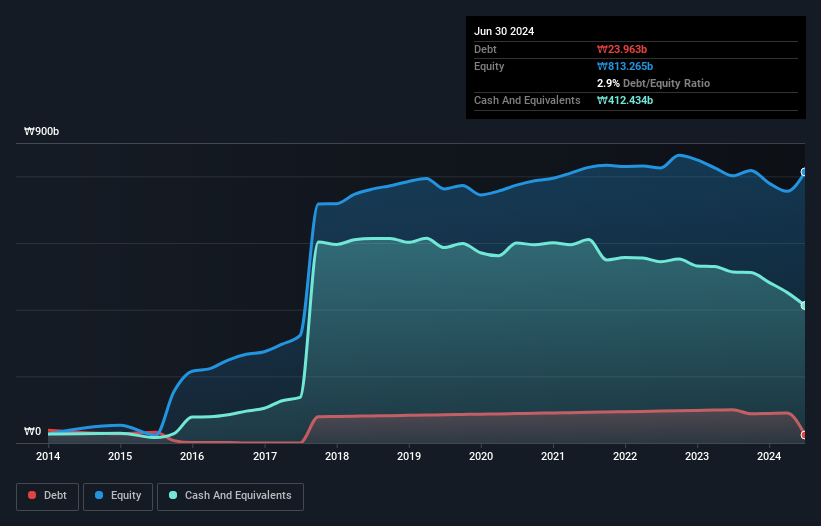
Howard Marks put it nicely when he said that, rather than worrying about share price volatility, 'The possibility of permanent loss is the risk I worry about... and every practical investor I know worries about.' When we think about how risky a company is, we always like to look at its use of debt, since debt overload can lead to ruin. Importantly, Hugel, Inc. (KOSDAQ:145020) does carry debt. But should shareholders be worried about its use of debt?
When Is Debt Dangerous?
Debt is a tool to help businesses grow, but if a business is incapable of paying off its lenders, then it exists at their mercy. If things get really bad, the lenders can take control of the business. However, a more frequent (but still costly) occurrence is where a company must issue shares at bargain-basement prices, permanently diluting shareholders, just to shore up its balance sheet. By replacing dilution, though, debt can be an extremely good tool for businesses that need capital to invest in growth at high rates of return. When we examine debt levels, we first consider both cash and debt levels, together.
See our latest analysis for Hugel
What Is Hugel's Net Debt?
You can click the graphic below for the historical numbers, but it shows that Hugel had ₩24.0b of debt in June 2024, down from ₩99.8b, one year before. But on the other hand it also has ₩412.4b in cash, leading to a ₩388.5b net cash position.

How Healthy Is Hugel's Balance Sheet?
According to the last reported balance sheet, Hugel had liabilities of ₩46.9b due within 12 months, and liabilities of ₩39.3b due beyond 12 months. Offsetting this, it had ₩412.4b in cash and ₩42.9b in receivables that were due within 12 months. So it can boast ₩369.1b more liquid assets than total liabilities.
This short term liquidity is a sign that Hugel could probably pay off its debt with ease, as its balance sheet is far from stretched. Succinctly put, Hugel boasts net cash, so it's fair to say it does not have a heavy debt load!
On top of that, Hugel grew its EBIT by 36% over the last twelve months, and that growth will make it easier to handle its debt. There's no doubt that we learn most about debt from the balance sheet. But ultimately the future profitability of the business will decide if Hugel can strengthen its balance sheet over time. So if you're focused on the future you can check out this free report showing analyst profit forecasts.
Finally, while the tax-man may adore accounting profits, lenders only accept cold hard cash. While Hugel has net cash on its balance sheet, it's still worth taking a look at its ability to convert earnings before interest and tax (EBIT) to free cash flow, to help us understand how quickly it is building (or eroding) that cash balance. Over the most recent three years, Hugel recorded free cash flow worth 61% of its EBIT, which is around normal, given free cash flow excludes interest and tax. This free cash flow puts the company in a good position to pay down debt, when appropriate.
Summing Up
While it is always sensible to investigate a company's debt, in this case Hugel has ₩388.5b in net cash and a decent-looking balance sheet. And we liked the look of last year's 36% year-on-year EBIT growth. So we don't think Hugel's use of debt is risky. Above most other metrics, we think its important to track how fast earnings per share is growing, if at all. If you've also come to that realization, you're in luck, because today you can view this interactive graph of Hugel's earnings per share history for free.
If you're interested in investing in businesses that can grow profits without the burden of debt, then check out this free list of growing businesses that have net cash on the balance sheet.
Valuation is complex, but we're here to simplify it.
Discover if Hugel might be undervalued or overvalued with our detailed analysis, featuring fair value estimates, potential risks, dividends, insider trades, and its financial condition.
Access Free AnalysisHave feedback on this article? Concerned about the content? Get in touch with us directly. Alternatively, email editorial-team (at) simplywallst.com.
This article by Simply Wall St is general in nature. We provide commentary based on historical data and analyst forecasts only using an unbiased methodology and our articles are not intended to be financial advice. It does not constitute a recommendation to buy or sell any stock, and does not take account of your objectives, or your financial situation. We aim to bring you long-term focused analysis driven by fundamental data. Note that our analysis may not factor in the latest price-sensitive company announcements or qualitative material. Simply Wall St has no position in any stocks mentioned.
About KOSDAQ:A145020
Hugel
Develops and manufactures biopharmaceuticals in South Korea and internationally.
Very undervalued with flawless balance sheet.
Similar Companies
Market Insights
Community Narratives



